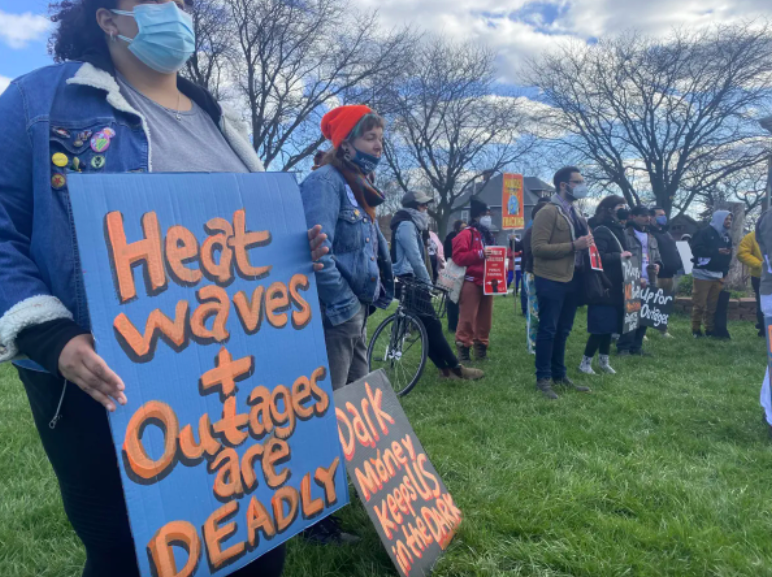In the sweltering heat last summer tens of thousands of southeast Michigan residents were left without power, some for more than a week. As a result, an untold amount of money was lost in spoiled food, medications, and trips to stay elsewhere to escape the heat.
The power outage wasn’t uncommon for the region serviced by DTE Energy, a utility some residents and lawmakers argue is notorious for service interruptions. And with increasingly severe storms caused by climate change, the issues are becoming more frequent for the state ranked among the worst in the country for outages.
On Wednesday, activists and residents from across the Detroit community rallied with State Rep. Abraham Aiyash in Highland Park to urge Michigan lawmakers to pass legislation to ensure accountability following power outages. The legislation, sponsored by Aiyash and co-sponsored by fellow Democratic Rep. Yousef Rabhi of Ann Arbor, would require utilities to pay customers $5 per hour for every hour they are without power. The bill was introduced in the state House earlier this month and is awaiting review.
“We don’t know when we’re having outages, but we can count on having them,” Highland Park resident Leslie Robinson told BridgeDetroit. “We’re out for anywhere from two hours to several days, no word of when we’d have power back. It’s a pins and needles thing.”
Robinson said a number of seniors on her block are vulnerable to power outages due to conditions worsened by extreme heat or cold, such as arthritis. Other neighbors, she added, endure medical conditions like diabetes, which requires them to store medicine in a refrigerator. With every power outage, Robinson said she loses $300 to $400 in spoiled food.
A few winters ago, when a power outage lasted several days, many of Robinson’s neighbors were forced to use gas stoves to warm their homes.
“For the most part, nobody has the money to go to a hotel or some other facility,” she said.
Under the proposed legislation, a $5 credit per hour would automatically be applied to customer bills to reimburse residents for losses from food, medicine, and more. After 72 hours without power, that credit would increase to $25 per hour. If customers experience several outages in a six-month span, they would be credited $100.
“That’s the least they can do,” said Robinson, noting when the power goes out “you have to ask and beg and maybe get that (reimbursement).”
“You’re at the mercy of billionaire companies that don’t have a face and could care less about your situation,” Robinson argued. In 2021, DTE reported earnings of more than $1 billion.
As it stands now, DTE customers with a power outage lasting more than 16 hours in non-catastrophic conditions and customers with outages longer than 120 hours in catastrophic conditions are eligible for a $25 credit. But in all cases customers must fill out a claim with DTE to request reimbursement, and wait to hear whether their situation qualifies for the credit.
In March, state officials approved a rule change that would bump the credit from $25 to $35 and would make the credits automatic, but the rule is not yet in effect
Brynn Guster, a spokeswoman for DTE, told BridgeDetroit that “the proposed bill is unnecessary” due to the orders issued last month by state regulators. The state rule changes also included additional service and technical standards, like shortening the response time to deal with an outage.
Guster added DTE has put $90 million toward its tree trimming program, accelerated investments in grid hardening, and submitted a five-year plan to regulators that will make the grid more resilient and reduce the cost of outages for customers.
Highland Park resident Michelle Jones said a power outage struck in summer 2020, just after she had gone grocery shopping. In the three days it took for the power to return, she’d lost $200 worth of food.
Jones said she didn’t qualify for the $25 credit and that she’s “really tired” of the ongoing issues with DTE including high rates and frequent outages.
After severe storms and 70 mph winds last summer left more than 500,000 DTE customers and 370,000 Consumers Energy customers without power, state regulators said they would create new utility reporting measures and make the data available online, including the number of outages, response times, and how much was paid out in credits. Damage to trees and utility poles and power lines resulted in many customers going more than a week without power. The database is expected to be ready in early 2023.
During Wednesday’s rally, Aiyash noted he’s working on additional legislation that would ban political engagement for utility companies.
“Instead of trying to buy politicians they should use that money to fix the damn grid and make sure people’s power is on and that our families and our communities are made whole,” he said.
For the groups that held the rally – the Michigan Environmental Justice Coalition, We The People, Detroit Action, Soulardarity, Citizens’ Resistance at Fermi Two, Michigan Interfaith Power & Light, and Empower Michigan at Avalon Village – it was the first time many had met in the years since COVID-19.
“It’s been a long three years and a dark three years of a lot of power outages,” Kamau Jawara, Detroit organizer for We The People, told BridgeDetroit. “When the power goes out it can be one of the most debilitating things,” he said, pointing to moms that lose frozen breastmilk and people that are susceptible to heatstroke.
The rally and legislation are the first of many things the community groups say they have planned in the upcoming months.
Jawara said he expects a “tough fight” in Lansing to advance the legislation.
“What is likely is that it sparks clear lines on where people stand,” Jawara said. “The runway is being able to see that, and then continuing to build this movement at a grassroots level.”
View the original article here.
